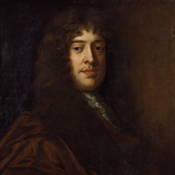
William Wycherley
Playwright
Biography
William Wycherley
Baptized on April 8, 1641, William Wycherley grew up in a comfortable middle-class family. When he was a teenager, Wycherley went to France for his education; while there, he converted to Roman Catholicism. Just before the English Restoration, he returned to England and studied at Queen's College, Oxford. This led to Wycherley's return to the Anglican Church, but he would again find himself a Catholic.
While Wycherley alternated between faiths, it seems that he took little interest in practicing the religion. His life's interests were dominated by the theatre and his own joyful indulgences. This pursuit of pleasure is a common theme in many of his plays. At one point, Wycherley enrolled in military service, although his actual tasks are largely unknown. He was registered in a regiment in 1672, but then returned home in early 1674. References to the sea and military service appear in several plays such as Love in a Wood and The Gentleman Dancing Master.
In 1679, Wycherley was employed as the tutor to King Charles' illegitimate son, the Duke of Richmond. While the boy would never qualify to be king, Charles wanted him to have a royal education, and the writer of such witty comedies as The Country Wife and The Plain Dealer seemed a good choice. However, as an employee of the king, Wycherley kept his marriage to a wealthy countess in 1679 a secret. She died in 1685 and left him her fortune. But debts and a disputed fortune still burdened Wycherley, and he spent time in Fleet Prison. After seven years, King James II released him, and his debts were paid.
In 1715, now a man of 74 years, Wycherley married a young woman named Elizabeth Jackson. The purpose of the marriage seems to be one of financial spite; less than a month after marrying Elizabeth, Wycherley died. He received the last rites of the Catholic Church before his death.
Wycherley's legacy is that of a witty poet and playwright, dedicated to the stage and a good time. He was a respected dramatist during his life, and even mentored others (such as the young poet Alexander Pope).
Known For
Shows
Shows associated with William Wycherley
Monologues
Monologues from shows associated with William Wycherley
Scenes
Scenes from shows associated with William Wycherley
Quizzes
Quizzes associated with William Wycherley
Learning Modules
Learning modules associated with William Wycherley
Additional Information
N/A